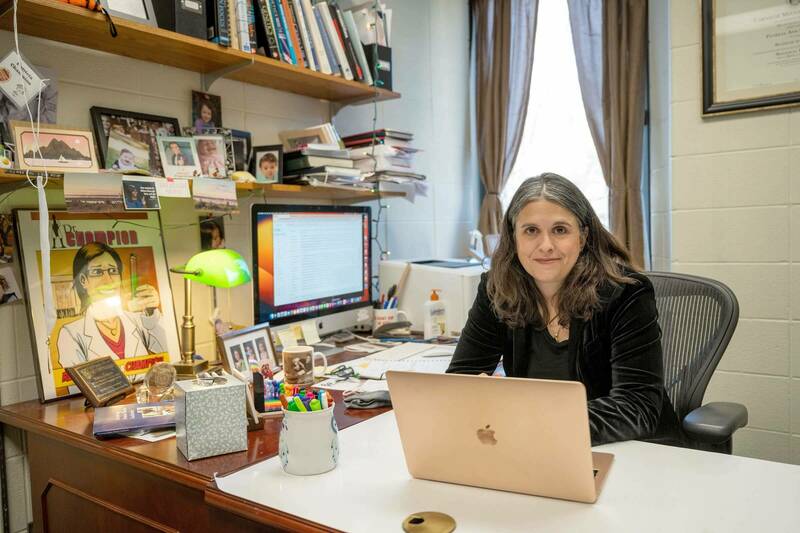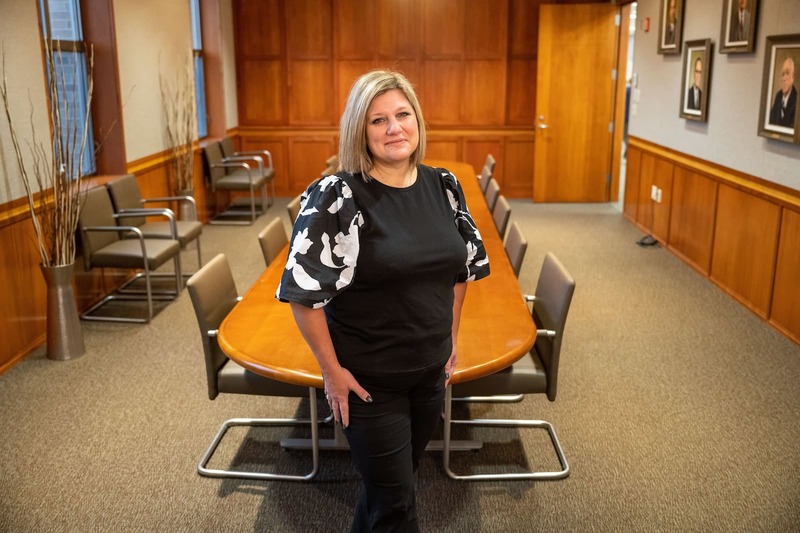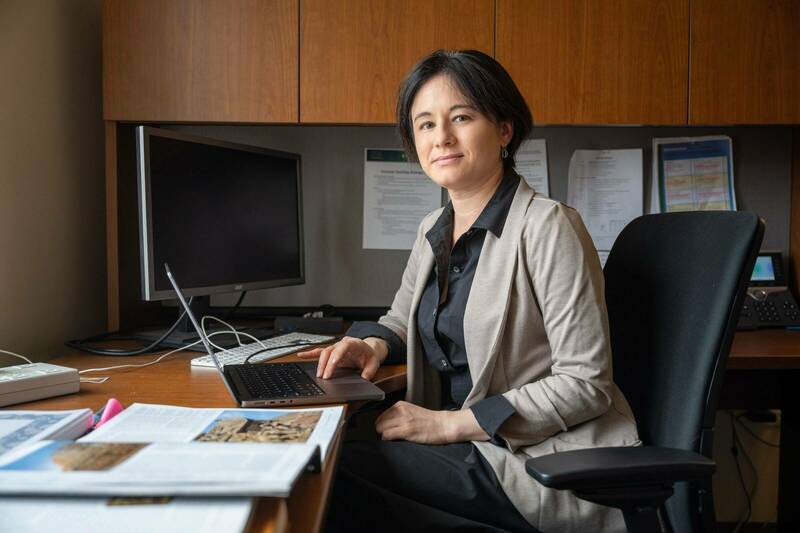The bacteria that cause tuberculosis are incredibly well-adapted to humans, yet researchers continue to unravel the mysteries of how the single-cell organisms work.
Patricia Champion, professor in the Department of Biological Sciences, has spent her career on the hunt, determined to understand the mechanisms used by Mycobacterium tuberculosis to cause disease — the leading microbial killer on the planet behind SARS-CoV-2, the virus that is responsible for COVID-19.
“When I was finishing up my graduate work there had just been a major discovery about the bacteria that cause tuberculosis, about a new transport system that moves proteins from the inside to the outside of the tuberculosis cell,” she said. “This was cool because this component was missing in vaccines used against tuberculosis.”
Champion, who has worked at Notre Dame since 2009 after earning her doctoral degree in microbiology from Princeton and completing a postdoctoral fellowship at the University of California San Francisco, always loved science. As a child in New Jersey, she had rich experiences exploring Manhattan, attending Broadway shows, and exploring the Jersey Shore. Torn between studying English and science, and with a love for art, singing and piano, Champion’s talents could have led her in many directions.
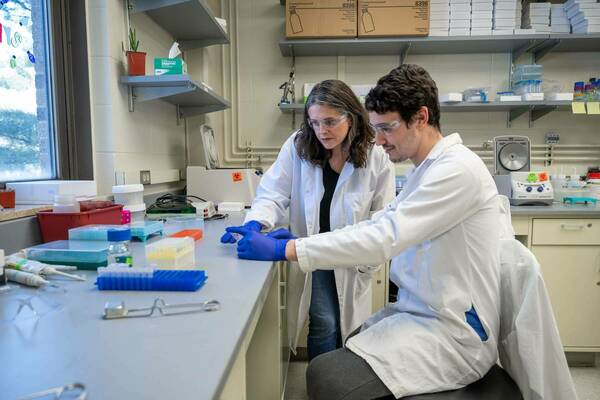
At first, she channeled her creativity into virology, but a rotation in a bacteria lab where she learned how to manipulate DNA and genes caused her to fall in love with bacteria instead. Deciphering how proteins move from the inside to outside of a cell became her passion, especially with regard to tuberculosis.
The probability of contracting a case of symptomatic tuberculosis, after all, is heavily dependent on nutrition, on money, on location and on the presence of other diseases.
“First of all, to treat tuberculosis, you need six months of antibiotics, and those don’t get rid of all the bacteria because the bacteria have developed mechanisms that allow them to just hang out in the lungs, so that’s a big problem,” she said. “We just don’t understand a lot of the fundamental biology — like how do the bacteria persist in the presence of drugs? And then, what are the mechanisms that they use to actually cause that infection and disease? There are so many talented researchers tackling these questions around the world.”
Her work contributions are guided by a desire to improve global health.
“I think it makes me try to consider equity and representation in every aspect of my research and teaching,” she said. “This is a practice and it is ongoing. I am trying my best to incorporate this everywhere, with the understanding that I have more to learn.”
“I think it makes me try to consider equity and representation in every aspect of my research and teaching.”
As a woman in science, Champion noted that pursuing tenure can be tricky. She began her job at Notre Dame when her children were young. Her husband, Matthew Champion, also started work at Notre Dame in 2009 and is now an associate professor.
“Starting a lab with a 3-month-old and an almost-2-year-old was a lot, and we didn’t have family here,” she said. “So that was hard, and then I had my last child just before tenure, which was a whole different set of challenges.
“I’m sure all women have had experiences where people have said things … probably without intent or probably without thinking about it, and it does make things more stressful when you have kids and you do this job,” she continued. “It just takes women who are aware of the challenges and who have gone through situations to pay it forward, and make sure the challenges don’t happen to other women who are behind them.”
Technology and innovation have helped women advance their careers because of remote work, but that can create problems as well by reducing work-life balance, she noted.
“It allows women to work while watching their kids, for example,” she said. “So while I think innovation and technology are positives, I think the thoughtfulness in which they are applied could impact women either way.”
Her laboratory focuses on diversity, equity and inclusion, and created a statement on those topics that everyone must sign off on, said Bradley Jones, a doctoral student in Champion’s lab. Champion is the primary faculty member associated with Notre Dame’s Expanding Your Horizons program, where middle school girls participate in STEM-related activities with mentors during a day of experiments. Champion’s lab members also participate in Association for Women in Science events.
Jones described Champion as a “bold” researcher. The members of the laboratory use a non-tuberculosis mycobacteria, M. marinum, as a stand-in for M. tuberculosis. They also use a wide array of molecular, genetic and biochemical approaches to study a certain type of mycobacterial secretion system to learn how proteins secreted by the system make mycobacterium more virulent.
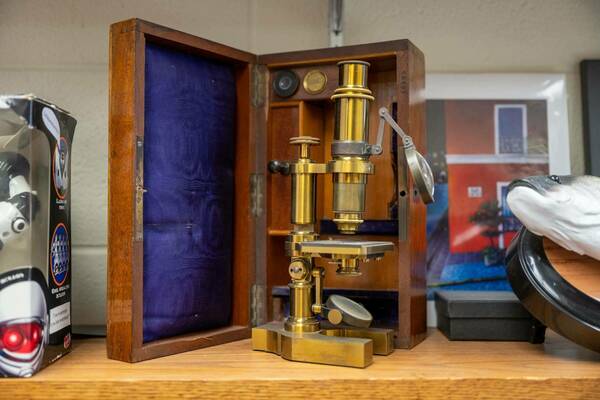
“We are also interested in how mycobacterial protein modifications influence these processes,” Jones said. “As the head of the lab, Dr. Champion is always willing to put forth time, resources and trust into us as graduate students in order to push our scientific discoveries forward and answer the important questions.
“She is never afraid to push the boundaries of what is possible, or what is currently known in the field,” he said.
Rachel Cronin, another doctoral student in Champion’s lab, has appreciated Champion’s mentorship, including one-on-one discussions about research goals, future career directions and potential fellowships.
“I had an opportunity to take a class in 2020 with her called Topics in Infectious Disease, which was co-taught by Professor Champion and Professor Shaun Lee,” Cronin said. “Professor Champion is a very good teacher because she helped us learn how to read scientific papers thoroughly yet efficiently. She teaches with enthusiasm and excitement, which made me excited about the topics we were learning. She was very encouraging and supportive.”
At the heart of the work, however, is the research into how tuberculosis works, with the eye toward contributing to knowledge that may promote an effective therapy in the future, Champion said. As she and others continue their research, the strategy and direction may also change dramatically, as they learn more details.
“I think that’s also what I like about it,” she said. “I mean, I love that people can use fundamental research to have direct implications and therapies and preventative measures, but just the idea that these bacteria have evolved such complicated ways to interact with their environment and with each other is just so fascinating.”
